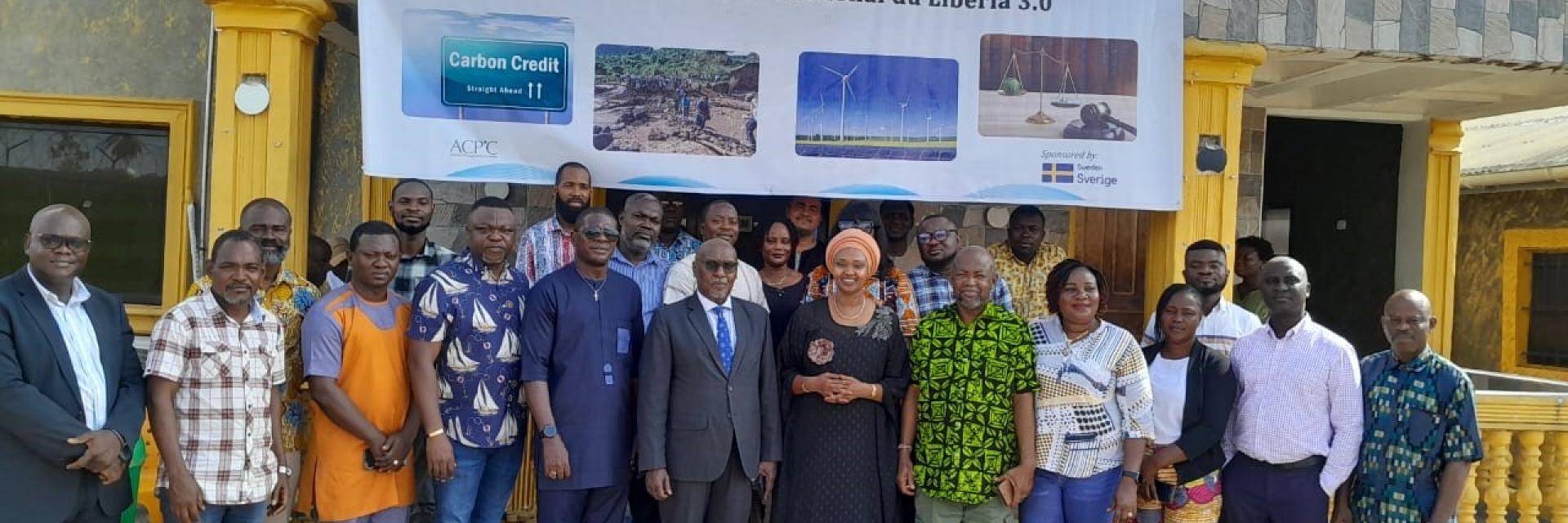Buchanan, Libéria, le 3 décembre 2024 (CEA) - Avec le soutien de la CEA et de l’équipe des Nations Unies au Libéria, des experts des secteurs économiques sensibles au climat du pays se sont réunis à Buchanan, au Libéria, les 2 et 3 décembre 2024 pour développer une nouvelle phase de Contributions déterminées au niveau national (CDN 3.0).
Depuis 2019, le Centre africain pour les politiques en matière de climat – ACPC, en collaboration avec les institutions régionales, le pôle CDN et les partenariats CDN, s’est lancé dans un processus structuré pour aider les États membres à réviser leurs CDN. Le soutien continu a été axé sur la demande et comprend la révision et la mise à jour des CDN existantes. Bien que les domaines spécifiques de soutien varient d’un pays à l’autre, le fil conducteur a été les consultations entre les groupes de parties prenantes représentant tous les secteurs touchés par le changement climatique.
Dans son discours d’ouverture, la Coordonnatrice résidente des Nations Unies, Mme Christine Umutoni, a noté que l’année 2025 marque non seulement le 10ème anniversaire de l’Accord de Paris mais aussi un moment critique dans la lutte collective contre le changement climatique. Les pays devraient soumettre des Contributions déterminées au niveau national (CDN) révisées qui soulignent leur engagement souverain en faveur de l’action climatique dans le cadre de l’Accord de Paris.
Elle a fait remarquer que le Secrétaire général de l’ONU a déclaré que les CDN ambitieuses constituent une priorité clé pour le système des Nations Unies, et que celles-ci révèlent un caractère important dans les agendas politiques du G20, du G7, de l’Union africaine et d’autres dialogues politiques majeurs. C’est pourquoi, « les deux prochaines années constituent l’une des meilleures chances dont nous disposons en tant que communauté internationale pour garantir que le réchauffement reste inférieur à 1,5°C, a souligné Umutoni ».
Cette dernière a appelé à « des CDN audacieuses qui ouvrent la voie à la transition verte et intègrent le climat aux priorités, aux plans et aux investissements de développement nationaux ; l’appropriation nationale des CDN donne aux pays le pouvoir de faire la transition d’une économie, d’atteindre les objectifs de l’Accord de Paris et de réaliser les Objectifs de développement durable.
Plus de 30 points focaux sectoriels nationaux ont participé à l’atelier et ont été rejoints par des experts en changements climatiques du PNUD, du secteur privé, du monde universitaire et de la CEA. Les responsables nationaux ont fait des présentations sur la politique d’adaptation et d’atténuation, l’agriculture, la foresterie et autres utilisations des terres (AFOLU), les écosystèmes d’eau douce et le mécanisme du marché du carbone, ainsi que leur inclusion et leur rôle que les nouvelles CDN entendent renforcer.
M. Frank Rutabingwa, s’exprimant au nom de la CEA, a rappelé le soutien passé que la CEA a fourni au Libéria par le biais de l’Agence de protection de l’environnement du Libéria - EPA, qui a débuté par un soutien à l’élaboration de la première stratégie et du premier plan d’action du Libéria en matière de réponse au changement climatique. La CEA a ensuite contribué à l’élaboration des Contributions prévues déterminées au niveau national (INDC) du Libéria menant à la COP15, les premières CDN du Libéria, à la formation des médias sur le changement climatique et au lancement actuel de la révision des CDN 3.0.
« La CEA continuera à soutenir l’Agence de protection de l’environnement du Libéria dans la lutte contre le changement climatique afin de renforcer la capacité de celui-ci à construire une économie résiliente qui facilite le développement durable », a déclaré Rutabingwa.
Le Conseiller technique en chef du Libéria et Point focal de la CCNUCC, M. Benjamin S. Karmorh, a prononcé le discours d’ouverture au nom du Directeur exécutif/PDG de l’Agence de protection de l’environnement du Libéria (EPA). Emmanuel Yarkpawolo où il a souligné l’importance de lutter contre la crise climatique mondiale et a ajouté que le Libéria est classé parmi les dix pays les plus vulnérables au monde et que le changement climatique a un impact sur le programme de développement du pays. Il a rappelé le soutien financier et technique de la CEA au Gouvernement du Libéria à travers l’EPA dans l’élaboration de l’INDC, de la stratégie de réponse au changement climatique et de ses premières CDN.
M. Karmorh a déclaré que les deuxièmes CDN du Libéria « étaient ambitieuses dans la mesure où elles cherchaient à réduire les émissions de gaz à effet de serre de 64 %, ce qui est inférieur au niveau de statu quo prévu d’ici 2030, sur la base des mesures conditionnelles et inconditionnelles ». Il a noté que la formulation des deuxièmes CDN était « un processus inclusif, consultatif et transparent ». Les questions de genre, de jeunesse et de personnes vivant avec un handicap ont joué un rôle important lors de la consultation nationale.
Sur la question de l’Article 6 de l’Accord de Paris, M. Karmorh a informé les participants que l’EPA travaille avec les parties prenantes nationales concernées « pour développer un mécanisme fondé sur des règles qui guiderait le marché du carbone du Libéria dans le but de réduire les émissions et de stimuler le développement économique ».
M. Karmorh a reconnu le rôle de facilitateur que la CEA et le PNUD ont joué dans la stratégie et le plan d’action du Libéria en matière de changement climatique et a assuré l’engagement des institutions de développement de l’EPA à intégrer l’action climatique dans le programme de développement du pays et ce dans les domaines de l’agriculture, des routes, de l’État de droit, de l’éducation, de l’assainissement et du tourisme (ARREST) pour un développement inclusif.
Publié par :
Section de la communication
Commission économique pour l’Afrique
B.P. 3001
Addis-Abeba
Éthiopie
Tél : +251 11 551 5826
Email : eca-info@un.org

